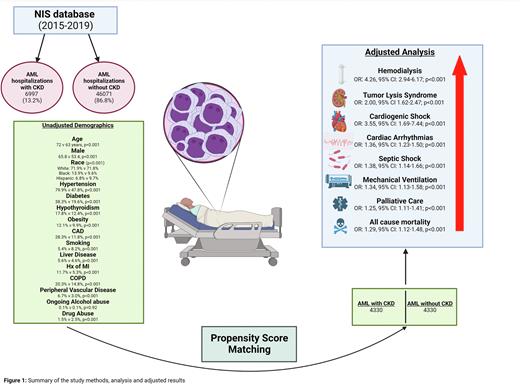Abstract
Background: Patients with baseline chronic kidney disease (CKD) are more susceptible to acute kidney injury during treatment for acute myeloid leukemia (AML). In addition, some CKD patients may not be a candidate for intensive therapeutic regimens due to their comorbidities. These factors increase the risk of complications during hospitalization for this subset of AML patients.
Methods: The data for this study was obtained from the publicly available National Inpatient Sample Database (NIS). We used the International Classification of Diseases, 10th Revision (ICD-10) codes to collect data on hospitalizations for AML for patients >18 years of age. The data was further classified into hospitalizations with or without CKD (all stages included). The Mann-Whitney U and Chi-square tests were performed to compare continuous and categorical variables respectively for the unadjusted data. Propensity Score Matching (PSM) was done to account for multiple potentially confounding demographic variables and co-morbid conditions such as age, gender, sex, chronic obstructive pulmonary disease (COPD), pulmonary hypertension, diabetes, hypothyroidism, obesity, coronary artery disease (CAD), history of myocardial infarction, smoking, liver disease, peripheral vascular disease (PVD), alcohol abuse, and drug abuse. A total of 4330 AML cases with CKD were matched with 4330 cases of AML without CKD (control group). A multivariate logistic regression model was then performed taking into consideration the hospital characteristics, median household income of the patients, and the previously mentioned comorbidities to generate the adjusted odds ratio for outcomes of interest between the two groups.
Results: The data for 53,068 hospitalizations for AML was collected between 2015-2019. Among these, 6997 cases had concurrent CKD. Patients with CKD were significantly older than their counterparts (72 vs 63 years, p<0.001), were more likely to be male (65.8% vs 53.4%, p<0.001), and black (13.9% vs 9.6%, p<0.001). They also had significantly more comorbid conditions like CAD, COPD, history of myocardial infarction, hypertension, diabetes, hypothyroidism, liver disease, and PVD. After PSM, multivariate logistic regression revealed CKD patients with AML had significantly higher odds of need for hemodialysis (OR: 4.26, 95% CI: 2.94-6.17, p<0.001), and mechanical ventilation (OR: 1.34, 95% CI: 1.13-1.58, p<0.001). AML patients with CKD also had higher odds of tumor lysis syndrome (OR: 2.00, 95% CI: 1.62-2.47; p<0.001), cardiogenic shock (OR: 3.55, 95% CI: 1.69-7.44, p<0.001), septic shock (OR: 1.38, 95% CI: 1.14-1.66, p<0.001), and all-cause mortality (OR: 1.29, 95% CI: 1.12-1.48, p<0.001). Interestingly, AML patients with CKD had lower odds of receiving a blood transfusion (OR: 0.87, 95% CI: 0.79-0.95; p=0.003), or platelet transfusion (OR: 0.79, 95% CI: 0.71-0.88; p<0.001) likely because of the lower chance of receiving intensive induction therapy as they had higher odds of receiving palliative care treatment instead (OR: 1.25, 95% CI: 1.12-1.48, p<0.001) (Figure 1).
Conclusion: This large retrospective study suggests CKD as an independent risk factor for adverse hospitalization outcomes regardless of treatment modality in AML patients. CKD should therefore be accounted for when making therapy decisions for this subset of patients.
Disclosures
Sweet:Mablytics: Consultancy, Honoraria, Membership on an entity's Board of Directors or advisory committees; AROG: Consultancy, Honoraria, Membership on an entity's Board of Directors or advisory committees; Curis: Consultancy, Honoraria, Membership on an entity's Board of Directors or advisory committees; Pfizer: Consultancy, Membership on an entity's Board of Directors or advisory committees, Research Funding; Novartis: Consultancy, Honoraria, Membership on an entity's Board of Directors or advisory committees; Gilead Sciences, Inc.: Consultancy, Honoraria, Membership on an entity's Board of Directors or advisory committees; Astellas: Consultancy, Honoraria, Membership on an entity's Board of Directors or advisory committees; Syntrix Pharmaceuticals: Research Funding; berGenBio: Consultancy, Honoraria, Membership on an entity's Board of Directors or advisory committees; Bristol Myers Squibb: Consultancy, Honoraria, Membership on an entity's Board of Directors or advisory committees; Incyte: Research Funding.
Author notes
∗Asterisk with author names denotes non-ASH members.


